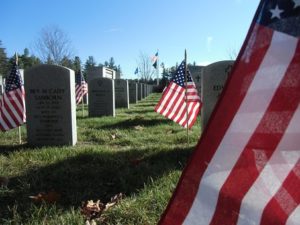POSTED IN: Veterans Benefits
TAGS:
Share this
Robert DiCicco left a Fields Corner three-decker in 1952 to join the Marines he had idolized while growing up during World War II. A year later, he found himself crouched in a crude Korean trench, fighting for his life against a swarm of Chinese troops who outnumbered his unit 20 to 1. DiCicco survived the horror at Carson Outpost, dug close to the present-day boundary that divides the Korean peninsula. He returned to Camp Lejeune, N.C., and married a Marine, brought her home to Dorchester, and later raised three children south of Boston while working for a fence company. But when he and his wife entered a nursing home last year in this Little Rock suburb, where they had moved to be near her family, DiCicco found himself battling the same government he had risked his life for, a bureaucratic nightmare that plunged his family into financial peril.
“This has been the most terrible thing I’ve ever been through,” said his widow, Mary Lou DiCicco. Her husband died March 2 at age 85, consumed by anxiety over a nursing-home bill that had risen to more than $40,000 since November — a bill that the US Department of Veterans Affairs should have helped pay, according to lawyers who specialize in veterans benefit claims and a belatedly regretful VA. In his last months, DiCicco routinely pushed his wheelchair to the front desk of the Four Seasons nursing home to inquire about his debt. Each time, as the total grew with no sign of government reimbursement, DiCicco’s burden grew heavier. “He died waiting for it,” said Mary Lou. “They do everything to get a man over there to get him shot at. He paid a debt to his country, and I feel that they owed him something.” “What makes me the maddest of all is that he didn’t die in peace,” said Steve DiCicco, Robert DiCicco’s son.
As wartime veterans, the DiCiccos are entitled to an “aid-and-attendance” pension, a benefit applied to the cost of caregivers at home or in assisted-living facilities. But like many veterans, the DiCiccos found themselves desperate and adrift while their nursing-home debt climbed and the VA failed to update them on the progress of their claim. Lesa Jacob-Pollich, the veterans service officer for Saline County, where the DiCiccos live, said she watched helplessly while the family waited month after month for an answer; she said a VA representative told her in October that the DiCicco claim would be approved. Nearly five months later, Robert DiCicco died while waiting for confirmation from the VA. In all that time, no one from the department reached out to him, the family said. For veterans and those who work closely with them, the DiCiccos’ plight is all too familiar, a small window into a veterans agency that critics say has long struggled to provide timely disability and pension benefits to the men and women who earned them. Many veterans advocates and lawyers who work on VA claims said the process often can take 12 to 18 months. The long waits have prompted a cynical refrain among many veterans frustrated with the bureaucratic lethargy of the VA: “Delay, deny, wait till they die.” Six days after his death, Marine Corporal Robert DiCicco’s claim had been approved. The debt has been paid, and his wife will be cared for. But he will never know.
For the full story written by Brian MacQuarrie, Globe Staff, go to: https://www.bostonglobe.com/metro/2018/03/24/vetsaid/2Su7FG8tun2sDUVPT7i9PJ/amp.html
Share this
Subscribe to our blog and monthly newsletter.











